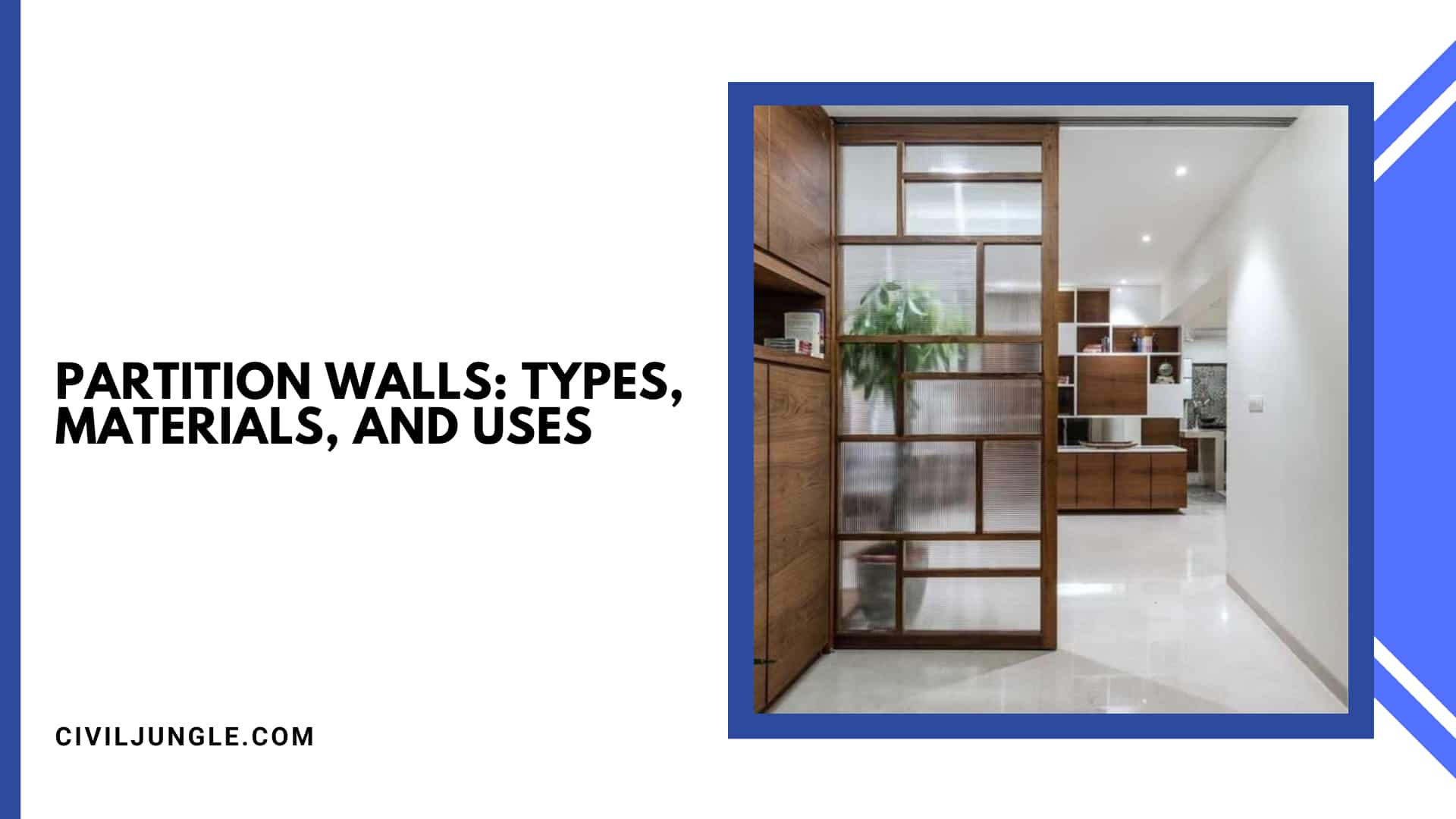
What Is a Partition Wall?
The partition walls that make for division or privacy in the interior portion of a building and do not carry the ceiling load and floor load that would be made with bricks, glass, or other materials are called partition walls. The load-bearing partition wall is known as the internal wall.
It has many types like folding, collapsible, and fixed types. If they carried a load of the walls and ceilings, then it’s called an internal wall.
The partition wall is a non-load-bearing wall; it doesn’t support the floor or ceiling and is used only for design purpose and partition purposes. A partition wall connects the floor and ceiling.
What is Temporary Interior Walls ?

A temporary interior wall is the same as other types of an interior wall, and this type of interior wall has various modifications. In temporary interior wall doesn’t contain electric wiring lines or plumbing lines.
This type of wall can be easily removed and easily repairable. It’s doesn’t so much expensive, like others. This temporary interior wall is built in the ground and set it to the place.
Sometimes it’s partially unfinished due to some reason, but that doesn’t hamper its beauty.
Uses of Temporary Interior Wall
Here, the uses of the interior wall are as follows.
- It divides a room and creates a separate space for another bedroom.
- It can create a small office in a large room.
- It covers all sewage lines and plumbing lines from sight to induce the beauty of the place.
- In the laundry, it creates a dryer vent, wire, pipes, etc.
- It can create a small storeroom at the side of the large room.
Walling Materials
There are different types of materials used to construct a wall. Some of them are:
- Brick
- Stone
- Glass
- Wood
- Plywood
- Cinder Blocks
- Metal Sheet
Let’s know for details of partition wall material.
1. Brick

- The brick is mainly used as wall material because it’s very easy to use and economical.
2. Stone

- In ancient times, the stone is used as a wall material.
3. Glass

- Now a day glass is a very useful material.
4. Wood

- Wood is used as wall material, and it’s quite a bit expensive, but the durability & longevity of wood is extremely good.
5. Plywood

- It’s used in interior wall materials.
6. Cinder Blocks

- Cinder block used to the soundproof barrier, and it’s economical.
7. Metal Sheet

- It’s quite expensive, but the durability of this type of sheet is high.
What is the interior wall material?
The interior wall material is quite delicate and need regular maintenance. In the wall finishes and the interior design, the concept of less is always more works better. These wall finishes change the aesthetics of the house completely and make your house look classy. And there is increasing usage of different types of these materials for aesthetic purposes in the interiors of properties.
Types of Interior Wall Materials
There are different types of the materials available in the market. Some of them are:
- Plywood wall
- Cement Blocks
- Brick and Masonry
- Stone wall
- Glass wall
- Wood
- Acoustic Tiles
- Steel Sheet wall
1. Plywood wall
- It is a bunch of wooden sheets glues together. Plywood is easy to use and easy to handle; the cost of this product is also reasonable. It’s excellent for crafting purposes.
2. Cement Blocks
- Sometimes hollow or solid cement block is used. It’s good to resist sound and heat. Using paint on it, it will give a fashionable look.
3. Brick and Masonry
- It’s an ordinary material. Most of the construction site uses bricks. Nowadays fly ash bricks are also a good substitute for fire clay bricks.
4. Glass wall
- It’s a little bit of expensive material used in bathroom partition, kitchen, etc.
5. Acoustic Tiles
- It’s an excellent soundproof material. It also gives us a stylish look at a reasonable price.
6. Wood
- Wood is the most versatile material. It’s an economically feasible and extremely stable product. It provides good sound insulation and withstands the high cold. Wood is also a biodegradable material.
7. Steel Sheet wall
- Steel sheet carries a great strength, so it’s used in building walls. Without taking cracks, it bends easily, but it’s a little expensive product.
Types of Partition Walls
There are many types of partition walls, those are:
- Brick Partition Wall
- Glass Partition Wall
- Hollow Clay Bricks Partition Wall
- Concrete Partition Wall
- Plaster Slab Partition Wall
- Timber Partition Wall
- Metal Lath Partition Wall
- Straw Board Partition Wall
- G.I. Sheet Partition Wall
- Asbestos Cement Partition Wall
1. Brick Partition Wall
- It is used in toilet and bathrooms.
- It can be designed with plain bricks or reinforced bricks. Bricks should have a compressive strength of 75 kg/cm². There are 10 cm, 15 cm, 20 cm thickness of brick partition wall used.
- In the construction of a brick partition wall, first-class bricks and cement mortar used.
- Brick partition walls are thin. So it’s to avoid buckling, we used reinforcement like steel bars.
2. Glass Partition Wall
- It provides a pleasing appearance and natural lighting inside the house or commercial building.
- Glass partitions are mostly used in offices and banks.
- Glass sheets are provided in a wooden frame.
3. Hollow Clay Bricks Partition Wall
- It is made of hollow clay bricks, which are prepared by heating at a high temperature.
- These bricks are light in weight and provide good thermal insulation and soundproofing.
4. Concrete Partition Wall
- Concrete partition walls are used in large buildings where the floor height is more.
- Concrete partition walls are durable and strong.
- It is constructed using reinforced concrete.
5. Plaster Slab Partition Wall
- These partitions are built using a mixture of gypsum, sand, and water.
- Plaster slab partitions are light in weight and provide good thermal insulation.
6. Timber Partition Wall
- Timber partitions are commonly used in residential buildings.
- Timber partition walls are economical and easy to construct.
- These partitions provide good sound insulation and are aesthetically pleasing.
7. Metal Lath Partition Wall
- Metal lath partitions are made of metal laths covered with plaster or gypsum.
- They provide excellent fire resistance and sound insulation.
8. Straw Board Partition Wall
- These partitions are made using compressed straw boards.
- Straw board partitions are economical and environmentally friendly.
9. G.I. Sheet Partition Wall
- Galvanized iron sheets are used to construct these partitions.
- They are durable, strong, and provide good fire resistance.
10. Asbestos Cement Partition Wall
- Asbestos cement partitions are made using asbestos cement sheets.
- They provide good thermal insulation and fire resistance.
FAQ of Partion Wall
What is a partition wall?
-
A partition wall is a non-load-bearing interior wall designed to
divide spaces within a building for privacy or functional purposes. It does not support the ceiling or floor loads and is typically made from materials like bricks, glass, or wood.
What are the types of partition walls?
- The main types of partition walls include:
- Brick Partition Wall
- Glass Partition Wall
- Hollow Clay Brick Partition Wall
- Concrete Partition Wall
- Plaster Slab Partition Wall
- Timber Partition Wall
- Metal Lath Partition Wall
- Straw Board Partition Wall
- G.I. Sheet Partition Wall
- Asbestos Cement Partition Wall
What are the uses of temporary interior walls?
- Temporary interior walls are used to:
- Divide a room to create separate spaces, such as an additional bedroom.
- Create a small office within a larger room.
- Cover sewage and plumbing lines to enhance aesthetics.
- Organize laundry areas by creating dryer vents and enclosing wires and pipes.
- Create a small storeroom within a larger room.
What materials are commonly used for constructing partition walls?
- Common materials used for partition walls include:
- Brick
- Stone
- Glass
- Wood
- Plywood
- Cinder Blocks
- Metal Sheets
What are the advantages and disadvantages of a brick partition wall?
- Advantages:
- Durable and reusable
- Economical to construct
- Effective in heat resistance and soundproofing
- Disadvantages:
- Time-consuming to construct
- Not suitable for seismic zones
- Difficult to clean

